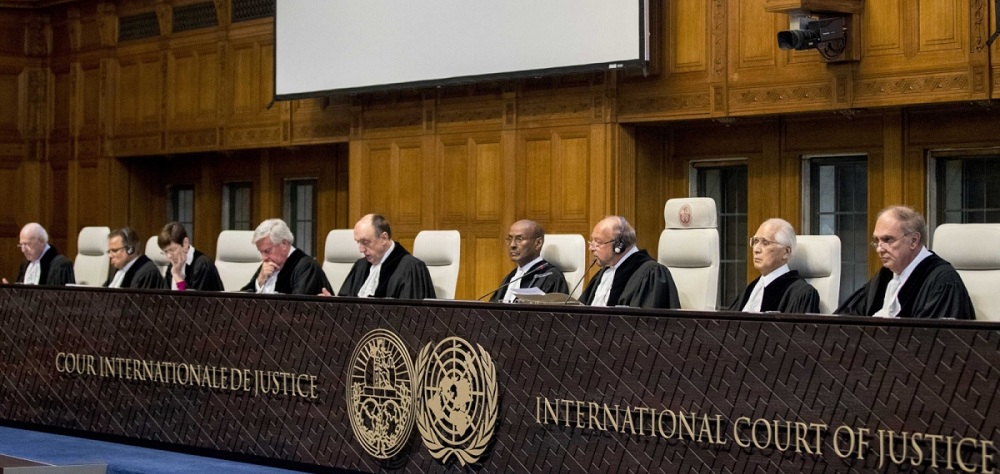Alwaght- On August 27, the International Court of Justice held its first hearing session on Iran’s lawsuit against the US sanctions and pressures. During the first session, the Islamic Republic delivered supporting proofs to its case. A day after, the US representatives defended their country's anti-Tehran ban. And in the next two days, the two sides engaged in additional defenses of their cases. During the hearing, Iran's lawyers called on the UN court to order lifting the anti-Iranian sanctions Donald Trump’s administration re-imposed or will re-impose after he on May 8 announced abandoning the Iran nuclear deal with the world powers.
What does Tehran sue Washington for?
During the hearing session, Dr Mohsen Mohebi, the head of the Iranian defense delegation, pointed to the effects of the embargo on his country, saying that the Iranian officials resist the US pressures and will defend themselves using all peaceful ways. Iran's lawyers argued that the re-imposed US ban against Tehran violates all commitments required by the past agreements between the two countries including the August 15, 1955 treaty of amity. They told the jury that the treaty asks both sides to avoid taking damaging actions against each other, and so the American sanctions need to be ruled suspended by the court until the final verdict is issued.
In the Iranian suit, delivered to the court in 19 pages, the US is accused of violating the terms of the 1955 friendship treaty after the US president in early May pulled Washington out of the nuclear agreement and reinstated the sanctions and threatened to put further strains on the Islamic Republic.
With this suit, the international court is asked by Tehran to announce as a violation the American re-imposing sanctions and threatening Tehran with toughest-ever economic restrictions. Further, the ICJ is asked to issue a binding verdict calling on the US to immediately lift the sanctions and end threats to place a new ban.
Tehran, furthermore, demands that Washington fully compensate for the damages to Iran as a result of US administration's hostile measures. Washington is also asked to refrain from the ICJ ruling negligence and offer guarantees on the issue.
UN court's qualification for Iran case
The International Court of Justice is the judicial wing of the United Nations to settle international disputes.
According to the international laws, the Hague-based court, has the jurisdiction to see into the cases referred to it by the governments. It also gives advisory view on the issues in response to requests by the international organizations.
If the two sides of a spat announce the commitment to its verdicts, the ruling will be binding. But the ICJ has no power to make the states committed to its rulings and in some cases, the countries decline to bow to it.
The US lawyer has said that the UN court has no jurisdiction to take the case. But the experts argue that sending a subpoena to the US signals that the ICJ has accepted qualification in the case.
The legal process outlook
As of now, the court held four sessions of hearing and will continue to explore each side's defenses.
There is a long-prevailing view on the international organizations which suggests that they are prone to the powers' influence. The Western powers, as the records show, have the biggest sway over the international bodies. The susceptibility to the Western influence has three reasons: They are majorly based in the Western countries, their staffs are majorly Western, and they are financially reliant on the Western governments.
Even if we become optimistic that the justice will be served and the ICJ will give its ruling without being influenced by the US and rule in favor of Iran, there is no promise that the verdict will find ground for implementation. Very likely the American side will not yield to the ruling implementation. In this case, Iran as a winner of the legal process can refer the case to the Security Council as the UN's implementation arm. But Washington as a permanent member of the Security Council has the veto power. So, can the UNSC force the US to implement to ICJ ruling? The answer is apparently no. This answer stands as a substantiation to the criticism against the inefficiency of the international organizations and their susceptibility to the big powers' sway.
By filing a case into the UN court, Iran seeks not just to exercise its right to respond to the American violations but also wants to make it clear that it is resolved to go all the necessary ways to pursue its legal rights. In other words, the Iranian lawsuit against the US is a legal and peaceful response within the framework of the UN charter to the Trump administration’s hostile moves against Tehran.
On the other side, so far only a limited number of the rulings did not make their way to implementation. Once the court rules for Iran, the US rejection of implementation will push Washington to further international isolation, apparently with political costs which are already heavy as Trump is currently in the middle of a confrontation with the US's European allies.



























